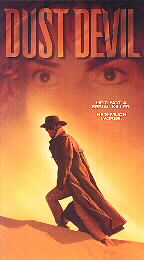
Starring: John Matshikiza, Robert John Burke, Chelsea Field, Rufus Swart
Production Budget: £4,300,000
Running Time: 103 min
The last film in the Compass of Horror, was, oddly, North, considering the movie shown was 1992's Dust Devil, made by a South African in Namibia. Not to worry, as it was a fine end to a great festival.
The titular Devil is a shape-shifting spirit who takes the form of an American nomad (Burke), wandering the desert roads of Namibia around the end of South African 'administration'. He finds lost souls - the lonely and unloved - and rather violently puts them out of their misery, usually after fulfilling their and his immediate sexual desires. Wendy (Field) is one such soul. Having run off from her husband, she picks up a hitchhiker who, while charming at first, turns out to be the previously mentioned psycho killer. Meanwhile, the local police are on the lookout for a serial killer with the help of the local shaman/drive-in movie manager, and Wendy's husband is looking for his wife.
Filmed on location in Namibia, Dust Devil is slow moving yet riveting. There is not much to the story itself - with a mystical element added to the traditional serial killer/slasher flick/road movie formula - and the acting is reasonably good, but the visuals are fantastic. There are some nice shots of long, straight desert roads, and Stanley makes great use of the heat haze that sits over the desert. There is also an amazing scene set in an abandoned mining town, half buried in sand. There are only a couple of scenes that could be considered horror per se, mostly centering on Wendy's attempts to escape from the Devil. The tension, however, is well maintained throughout, and the Dust Devil is well crafted bad guy. It cuts nicely between the three competing story lines, following Wendy, the police, and the husband at different points. The ending is also clever, with a bit of a twist that I wouldn't have seen coming, except that some academic spoiled it for me in a lecture on psychoanalysing movies the previous evening. If I ever see him again, I'll give him something to psychoanalyse.
The film includes elements referencing the end of apartheid, and the effect this had on not only the South Africans, but the people of Namibia, which was administered by South Africa during this period. Scenes invoking the after-effects of South African politics include the beating of a white man in a bar full of black men (they just can't trust him, even though he means no harm), and the beating of a black man by a couple of white policemen. The pull-out of troops enlivens the final scene of the movie.
I can't recall seeing many movies set in southern Africa. There is The Gods Must Be Crazy and that's about it. A location can have such a big impact on the feel of a movie, and Dust Devil is all about the location. This gives the movie a uniqueness, when it otherwise could have been just another horror/road movie.
After the movie, Richard Stanley and critic Kim Newman had a panel discussion, with Stanley giving some great and some bizarre answers to audience questions. He described spending a night painting mystical drawings on a wall with pig's blood in order to get one of the classic shots in the film. He also described his relationship with the druids (they won't let him in their stone circles because he won't wear white), and his sister (he genuinely expects her to be murdered for her continued belief in Apartheid). He also explained why he was booted off/quit the remake of The Island of Dr. Moreau, that he had written and had started shooting before John Frankenheimer took over. He thinks the reason is that the movie he wanted to make would be too extreme for a mass audience, yet the budget was such that a mass audience was needed to recoup costs, and the producers got scared. Also, he's not allowed to make any more movies in Namibia, even though he'd love to, because the government has a thing against sex and violence. Apparently for his next movie, he's moving on to Canary Islands sex and violence, for a project called Vacation, which sees an American couple stuck in the Middle East when a nuclear war begins.
This may be the last time this film gets shown in a cinema, as Stanley is donating his copy of the print to the BFI archives, which is a shame, because the scope of this film is such that it really shines on the big screen. Unlike End of the Wicked, oh man, did I mention how crap that was?
$$$$

No comments:
Post a Comment